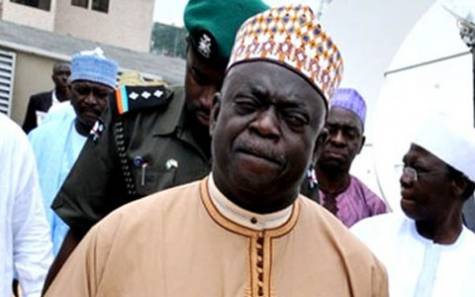A Federal High Court on Monday in Lagos fixed June 6 foe ruling on the objection by a former Governor of Abia, Orji Uzor Kalu, to the evidence of a prosecution witness in his trial.
The Economic and Financial Crimes Commission (EFCC) had on Oct. 31, 2016, slammed a 34-count charge of N3.2 billion fraud on Kalu and his ex-Commissioner for Finance, Ude Udeogo.
Also charged with Kalu is his company — Slok Nigeria Ltd.
The accused had pleaded not guilty to the charges.
During an examination-in-chief on Monday, a prosecution witness, Mr Romanus Madu, led in evidence by EFCC prosecutor, Mr Rotimi Jacobs (SAN), said he did not author a statement requesting for the sum of N30.8 million bank draft in the course of his duties as a cashier in the Abia State Government House in 2005.
He identified his name on a document exhibited by the prosecution, but said that he was not the author, noting that his signature was not on the document.
The prosecutor also showed him two other applications for the bank drafts written by one Obasi John and Ogbonna J, which he also denied knowledge of the two individuals at the Government House.
He said he did know anything about bank drafts, but that he usually collects cash and hands it over to his “superior”, adding that he was not familiar with the names Obasi and Ogbonna.
When the prosecutor further sought to extract the witness’ evidence on the three applications, it was opposed by the defence lawyers.
In his objection, Kalu’s lawyer, Chief Awa Kalu (SAN) said the prosecutor’s action was against the spirit of the Evidence Act.
He argued that the witness cannot be asked to compare signatures of persons he claimed he did not know.
In the same vein, counsel to the third accused (Slok), Mr K. C. Nwofo (SAN), also argued that it was only an expert that could be asked questions on such a contentious issue.
In his response, however, the prosecutor insisted that the witness was “highly qualified” to give evidence on the statement which he argued was written and signed by him.
According to him, evidence with regards to handwriting is not an exclusive preserve of an expert.
“The law permits the court to take evidence from the person whose handwriting was said to have been forged or the person who is familiar with the handwriting.”
After listening to the arguments of both parties, Justice Mohammed Idris adjourned until June 6 for ruling.
In the charge, the accused were alleged to have committed the offence between August 2001 and October 2005.
Kalu was alleged to have utilised his company (Slok) to retain in the account of a First Inland bank, (now FCMB), the sum of N200 million.
The sum is alleged to have formed part of funds illegally derived from the coffers of the Abia State Government.
Slok and one Emeka Abone, who is still at large, are also accused of retaining in the company’s account the sum of N200 million on behalf of the first accused (Kalu).
The accused, according to the prosecution, also retained about N2.5 billion in different accounts property of Abia.
Cumulatively, in all the counts, the accused were alleged to have diverted about N3.2 billion from the Abia State Government’s treasury during Kalu’s tenure as governor.
The offences contravened Sections 15(6), 16, and 21 of the Money Laundering (Prohibition) Act, 2005 and the Money Laundering Act of 1995 as amended by the amendment Act No.9 of 2002 and Section 477 of the Criminal Code Act, Laws of the Federation, 1990. (NAN)



